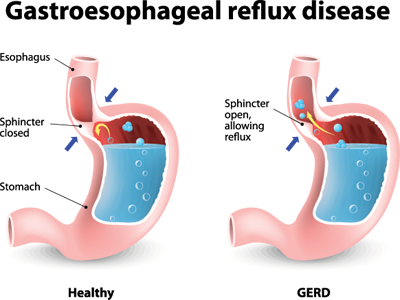 The holidays are here again and whether your favorite food is turkey or apple pie, it’s going to be a problem if you suffer from reflux. We are heading into the home stretch of food-focused festivities and the only way you are going to enjoy them is if we help you get reflux under control.
The holidays are here again and whether your favorite food is turkey or apple pie, it’s going to be a problem if you suffer from reflux. We are heading into the home stretch of food-focused festivities and the only way you are going to enjoy them is if we help you get reflux under control.
The most common types of reflux are LPR and GERD. LPR stands for Laryngopharyngeal Reflux, or Silent Reflux, and GERD stands for gastroesophageal reflux disease. Both are digestive diseases and both cause discomfort that needs to be properly diagnosed. Here are the signs and symptoms of each type of reflux.
LPR, or Silent Reflux, occurs when food or stomach acids flow back up into the voice box, throat, or even the sinuses. These areas can become inflamed because they’re not protected against the acid backflow. This backflow, or reflux, is manifested by esophageal sphincters, or muscle rings, that are not functioning properly and can happen whether you have eaten or not. Sometimes it can feel like an allergy, a sinus issue or even pulmonary disease. Most people do not experience the obvious signs and symptoms of heartburn or indigestion, which is why LPR is called Silent Reflux.
GERD, on the other hand, has all the classic signs and symptoms of reflux including burning chest pain, persistent heartburn, acid regurgitation, nausea, hoarseness in the morning, trouble swallowing, a dry cough and bad breath. Some people have GERD without heartburn but experience chest pain that is severe enough to mimic a heart attack. GERD occurs when acid and partially digested food from the stomach actually make their way back into the esophagus, the tube that connects the stomach to the throat. That allows stomach acid or bile to irritate the lining of the food pipe. GERD can be especially dangerous and cause a condition called Barrett’s Esophagus, a change in the lining of the esophagus that can lead to cancer.
GERD and LPR can occur separately or together. Anyone can suffer from them – men, women and children, caused by physical, lifestyle or dietary factors. That’s why if you experience the symptoms we described above more than twice a week, it’s important to see an ENT doctor. Early detection of these conditions can be treatable and prevent the long term damage that acid can wreak on your digestive health.
Who Can Treat GERD and LPR?
It may seem odd, but an Ear, Nose, Throat (ENT) physician is the specialist to see for the treatment of GERD and LPR. A gastroenterologist, or GI physician, who specializes in the digestive tract and other gastrointestinal functions, can diagnose either condition which may include a physical exam, endoscopic exam, or pH monitoring. However, an ENT specialist is trained to treat the problems caused by GERD and LPR that can extend beyond the GI tract into the ear, nose and throat.
For example, if GERD causes hoarseness, narrowing of the airway, swallowing difficulties, throat pain and sinus infections, those are the areas treated specifically by an ENT physician who specializes in treating diseases of the head and neck.
The treatments for GERD and LPR are fairly straightforward and, for the most part, non-invasive. The majority of people respond well to medication and lifestyle changes. Some of the most effective medications are over-the-counter, such as antacids. Other effective medications include proton pump inhibitors and foam barrier medications. Lifestyle changes include eating small meals slowly, reducing or stopping alcohol intake, and not eating or drinking within two or three hours of going to bed. Once you identify the foods that cause the most problems you can limit their intake and greatly reduce the problems associated with GERD and LPR. Common problem foods include caffeine, sodas, peppermint, and citrus fruits.
We certainly don’t want to throw a damper on your ability to enjoy Thanksgiving dinner or traditional holiday foods like cheesecake and Potato latkes. We want you to sit down to dinner and enjoy your favorite foods to your heart’s content – without discomfort and pain. If you consistently have the signs and symptoms of GERD and LPR, come see the ENT specialists at Berger Henry. We know a lot about LPR and GERD and can help diagnose and relieve your symptoms.
